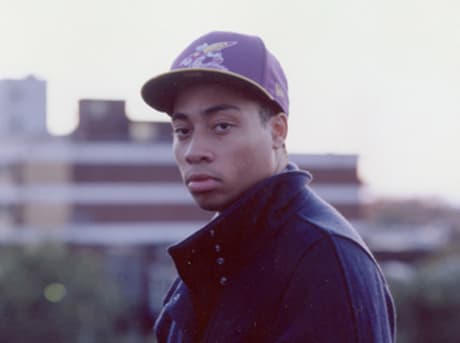"I've always felt like most rappers are schizophrenic," Cadence Weapon says, contemplating a question about the dynamic structure of his long-anticipated album, Hope in Dirt City. "When you really think about a guy like Lil B, he's insane. You listen to his music and it's like, 'What music does this guy make?' It's just his voice coming from different directions, saying different things, and being different people all of the time. It's like, yeah; this guy's crazy."
Oddly enough, Cadence Weapon inhabits a few distinct personas on his latest record, which, though he might insist otherwise, possesses a kind of muted joy ― a conflicted tone that must be traced back to the mind behind it. For all its musical exuberance (inspired by Grace Jones, Talking Heads and Sly and Robbie among others) and clever lyrical bravado, Hope in Dirt City is introspective, dark, and even a little seedy. It's the product of a young rapper thriving in Montreal's club culture ― with its lustful promise of hook-ups and vague subversion ― yet deeply connected to his rougher-than-meets-the-eye hometown, Edmonton (the "dirt city" in question), where he might be best known by his birth name, Roland Pemberton.
"It's me trying to reconcile my feelings about moving," he says. "Everything I've put out so far has been so connected to regionalism, but here I was trying to loosen up and make songs that are fun for me and for the listener. Like the title track of the album; I made that as a way of saying goodbye to Edmonton ― sort of closing off that chapter of my career."
The champion city was good to him but it wasn't always easy; after he was named Edmonton's poet laureate for a two-year term in 2009, Pemberton faced snooty scrutiny about the merits of his raps, both from academic-types and hip-hop fans resistant to his charms. All of this ultimately motivated him to shut haters up.
"I read people talking about my voice and they say it's flat or something when, really, that's a conscious decision, to express the weariness of the content of a song," he explains. "But I do want to make it easier for people to like or understand this. With a song like 'Get on Down' where I'm really going in, it's like, 'This is undeniably good rapping.' I know what I'm capable of but I thought, 'I need to have more proof.' That's what this album is.
"It's weird," he says of Hope in Dirt City. "It's a juxtaposition of me being the most personal I've ever been in my life, and being very clear about what I'm talking about, and me just totally not being me ― like a dramatized version of my life as well. But it's very freeing to have an album where I play so many different positions and can be so malleable. It would be such a drag to just be saying the same thing every time."
Oddly enough, Cadence Weapon inhabits a few distinct personas on his latest record, which, though he might insist otherwise, possesses a kind of muted joy ― a conflicted tone that must be traced back to the mind behind it. For all its musical exuberance (inspired by Grace Jones, Talking Heads and Sly and Robbie among others) and clever lyrical bravado, Hope in Dirt City is introspective, dark, and even a little seedy. It's the product of a young rapper thriving in Montreal's club culture ― with its lustful promise of hook-ups and vague subversion ― yet deeply connected to his rougher-than-meets-the-eye hometown, Edmonton (the "dirt city" in question), where he might be best known by his birth name, Roland Pemberton.
"It's me trying to reconcile my feelings about moving," he says. "Everything I've put out so far has been so connected to regionalism, but here I was trying to loosen up and make songs that are fun for me and for the listener. Like the title track of the album; I made that as a way of saying goodbye to Edmonton ― sort of closing off that chapter of my career."
The champion city was good to him but it wasn't always easy; after he was named Edmonton's poet laureate for a two-year term in 2009, Pemberton faced snooty scrutiny about the merits of his raps, both from academic-types and hip-hop fans resistant to his charms. All of this ultimately motivated him to shut haters up.
"I read people talking about my voice and they say it's flat or something when, really, that's a conscious decision, to express the weariness of the content of a song," he explains. "But I do want to make it easier for people to like or understand this. With a song like 'Get on Down' where I'm really going in, it's like, 'This is undeniably good rapping.' I know what I'm capable of but I thought, 'I need to have more proof.' That's what this album is.
"It's weird," he says of Hope in Dirt City. "It's a juxtaposition of me being the most personal I've ever been in my life, and being very clear about what I'm talking about, and me just totally not being me ― like a dramatized version of my life as well. But it's very freeing to have an album where I play so many different positions and can be so malleable. It would be such a drag to just be saying the same thing every time."
